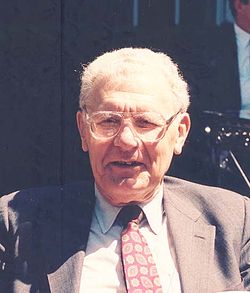How to change the system
- Ayrıntılar
In praise of the ideas of Russ Ackoff
 IT IS hard to imagine a less enticing title for a book than “Introduction to Operations Research”. Yet Russ Ackoff, one of the authors of this tome of 1959, who died on October 29th aged 90, did not just help to define a nascent branch of industrial engineering. He wrote 30 other books, becoming one of the most influential management gurus of the 20th century in the process. His ideas about systemic thinking are vitally important today if the world is to come out of the current economic crisis in better shape than it went into it.
IT IS hard to imagine a less enticing title for a book than “Introduction to Operations Research”. Yet Russ Ackoff, one of the authors of this tome of 1959, who died on October 29th aged 90, did not just help to define a nascent branch of industrial engineering. He wrote 30 other books, becoming one of the most influential management gurus of the 20th century in the process. His ideas about systemic thinking are vitally important today if the world is to come out of the current economic crisis in better shape than it went into it.
Today’s crisis is the result of a catastrophic failure, primarily in the financial system but also of our economic and political systems. Mr Ackoff spent most of the past half-century as the premier evangelist of systemic thinking, which he contrasted with the reductionist, atomistic thinking that had long dominated humanity’s approach to problem-solving in his view. Time and again, he would point out, decision-makers faced with crises failed to heed Albert Einstein’s warning that “we can’t solve problems by using the same kind of thinking we used when we created them.”
Put simply, systems thinking—which Mr Ackoff described in books such as “Redesigning the Future: A Systems Approach to Societal Problems” (1974)—focuses on the performance of a system as a whole. This is in contrast to an approach that breaks systems into parts and focuses on the performance of the individual parts, on the assumption that if each individual part is improved then the sum of the parts will also be better. This assumption often proves wrong in practice, said Mr Ackoff, who had plenty of practical experience as a consultant to more than 250 corporations and 50 government agencies. The only profession that he believed had truly embraced systems thinking is architecture, where the design process starts by asking what sort of building is desired, and then works backwards to focus on what individual parts are required. An architect never starts by saying, “Here are the parts, what can I build from them?”









